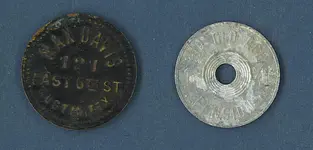According to the Trade Tokens of Texas (supplement to the Journal of the Token and Medal Society - TAMS) by Fowler, Roberts, & Strough, Max Davis opened at 121 E. Sixth in 1898, and operated there until the Volstead Act ("Prohibition") put him out of business in 1918. The catalog value assigned to the token is $7.50 (1973).
The Oklahoma sales tax token is ca. 1935-45. To add to the tax base, a number of states instituted a sales tax during the Great Depression. They had not figured out the "rounding" scheme in use today where there is no tax on a small purchase, say 10? or less and there is a 1? tax on purchases 11-25?, 2? on something higher, etc. In the early days of sales taxes, if you bought a 2? item, you would be taxed 1/10? or one Mill. In order to make change, these tokens were used - you would pay 3? and get your 2? item and 9 tokens in change. (of course these numbers are approximate). So locals would use the tokens on the next purchase, but tourists would carry them home as souvenirs. There were millions of tax tokens produced, and they can be found all over the world. They were made in aluminum, brass, zinc, cardboard, plastic, and (I think) fiber.
John in ID




